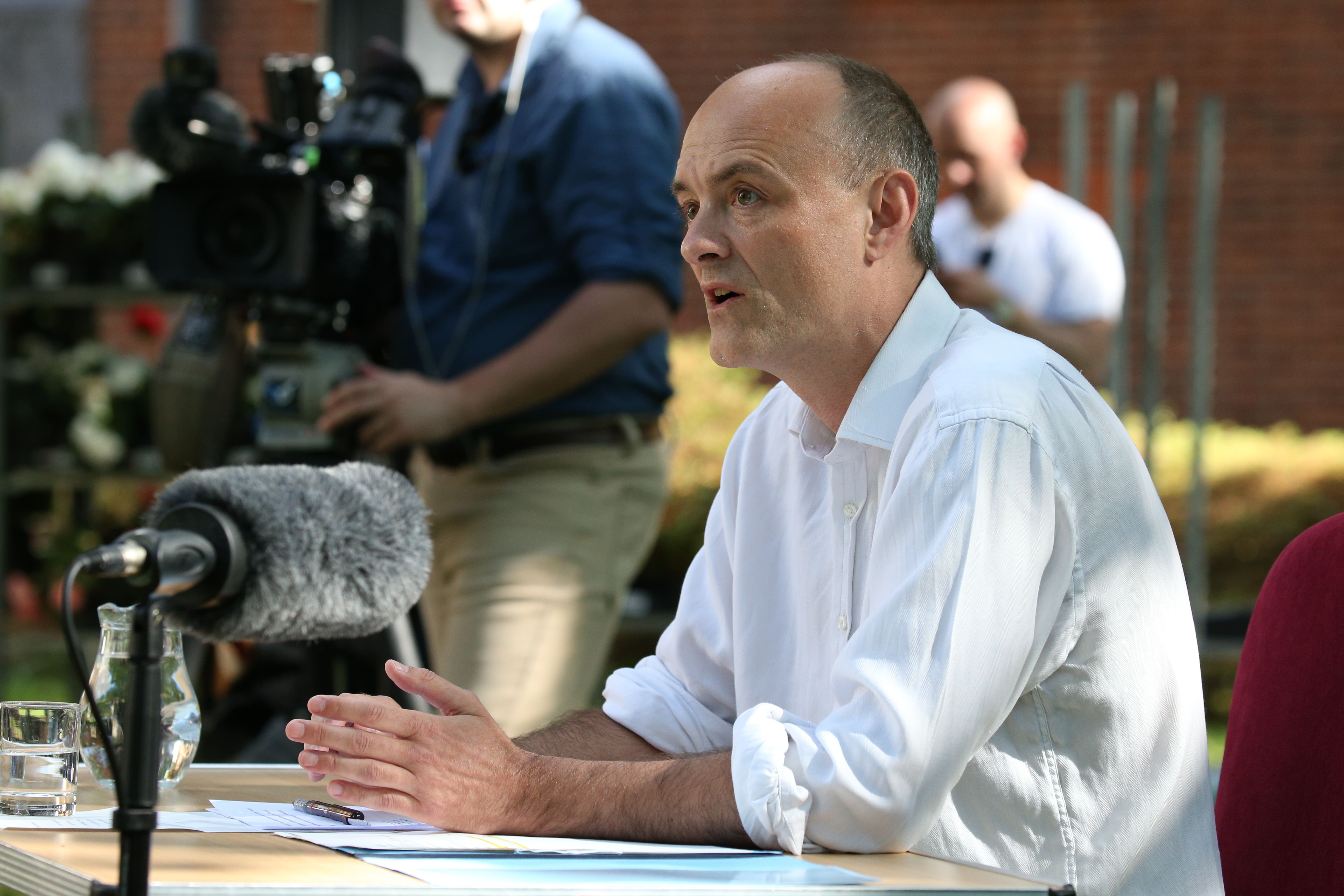Patrick Vallance said Cummings’ Durham trip ‘clearly against lockdown rules’
The former chief scientist also said he and Professor Sir Chris Whitty felt ‘strong armed’ into appearing at a press conference, but they ‘got out’.

Dominic Cummings’ press conference on his lockdown trip to Barnard Castle was described as a “car crash” by the former chief scientist, who said the journey had clearly gone against the rules at the time.
Sir Patrick Vallance, writing in his notebooks at the time in May 2020, also said he and England’s then-chief medical officer Professor Sir Chris Whitty felt No 10 officials were trying to “strong arm” them into appearing by Boris Johnson’s side at a Downing Street press conference afterwards.
Monday’s hearing at the UK Covid-19 Inquiry heard Mr Cummings, who became well-known to the public when news of his trip to the Co Durham beauty spot emerged, described as “the most empowered chief of staff Downing Street has seen”.
He will give evidence to the inquiry on Tuesday.
His name cropped up numerous times during Monday’s session, as Mr Johnson’s then-principal private secretary Martin Reynolds described the power he believed Mr Cummings was able to wield in Downing Street.
Mr Reynolds told the inquiry there had been an “unusual dynamic around Dominic Cummings”.
He added: “In my view he was the most empowered chief of staff Downing Street has seen and was the person whose writ ruled, who was able to drive things through the machine in the way I suspect few other chiefs of staff have done.”
More disclosures emerged from Sir Patrick’s pandemic-era notes, with him saying neither he nor Sir Chris were “at all keen” to do a press conference with the then-PM Mr Johnson, describing it as “highly political and dwarfed by DC (Dominic Cummings)”.
An extract from Sir Patrick’s notebooks, dated May 25 2020, said he and Sir Chris were “very reluctant to do the press conference”.
Appearing to refer to an easing of lockdown rules, the note described the PM as “very bullish and wants to have everything released sooner and more extremely than we would”.
It went on: “Wants to divert from the DC fiasco (caught have gone to Durham – clearly against the rules). All very worrying. Cabinet all upbeat and ‘breezy confidence’ – incredibly alarming.”
Sir Patrick said senior officials in Number 10, including Mr Reynolds, had tried to “strong arm” him and Sir Chris into doing a press conference around that time.
Sir Patrick described Mr Cummings’ Downing Street rose garden statement to the media as a “car crash” and “rambling”, and said they had gone to speak to Mr Johnson about not doing the press conference.
Sir Patrick said the PM “got immediately that this was too political for us and that it put us in an awkward position”.
But he added: “The apparatchiks tried to strong arm us (Lee, James and even Martin his PPS).”
Sir Patrick said Mr Cummings had returned from making his press statement and said the men should not do the news conference, with the scientist appearing to express relief when he added “We got out!”.
Later entries in Sir Patrick’s notebooks accused the then-prime minister of being weak and indecisive, and in one entry claimed his “ridiculous flip-flopping” was getting worse.
Mr Reynolds said he had spoken to Mr Johnson and “questioned whether it was sensible for him (the PM) to support Dominic Cummings in the way he was doing”.
He also accepted he had spoken to Sir Chris and Sir Patrick but rejected that his conversation with them was “strongarming”.
Despite Sir Patrick’s own assessment that Mr Cummings had broken the lockdown rules in April 2020, Durham Constabulary ruled that Mr Cummings may have committed a “minor breach” of Covid laws.
But the force said it would not issue him with a fine, in line with its policy not to take “retrospective action” over the rules during the pandemic.
Mr Reynolds had earlier described how there had been “unease” around a so-called “shitlist” of civil servants, as the inquiry heard about the internal workings of Downing Street and the Cabinet Office before the pandemic.
Mr Reynolds said: “There was, I think, quite a bit of unease in the civil service around, and excuse my language, the so-called shitlist of people who were thought to be risks in what was perceived to be a potentially more muscular approach to the civil service.”
Mr Reynolds also rejected a suggestion made by Mr Cummings in his statement to the inquiry that the former principal private secretary was “too deferential” to Mr Johnson and had “shied away from confronting him with hard issues”.
Mr Reynolds said he had given Mr Johnson “very clear advice when I disagreed with him”, but added that those occasions related to “issues where I felt it was my role as the principal private secretary to step in and give that advice”.
Bookmark popover
Removed from bookmarks